Key highlights
- Understand what cloud hosting is and how it compares to shared and VPS hosting options.
- Learn how to evaluate providers based on real-world performance, scalability, support and pricing.
- See a side-by-side comparison of the top 10 cloud hosting providers for every business size.
- Find out why we at Bluehost stand out with built-in SEO, daily backups and WordPress integration.
- Explore how cloud hosting supports everyone from freelancers and agencies to high-traffic ecommerce stores.
It’s no brainer that cloud hosting improves your website’s speed, scalability and uptime by distributing traffic across multiple virtual servers. It has become the standard for businesses that require better reliability than what shared hosting typically offers.
However, switching to cloud hosting doesn’t always guarantee better results. Many business owners make the move for faster, high-quality performance but end up dealing with unexpected downtime or confusing setup options.
These issues often boil down to choosing a cloud hosting provider that doesn’t meet their specific needs. A freelancer doesn’t need the same level of infrastructure as an eCommerce store. An enterprise team needs more control than a basic web hosting setup can provide.
So, to make it easier for you, we have come up with a guide comparing the top 10 cloud hosting providers for 2026. However, before selecting the right platform, it’s important to know what cloud hosting is and how it differs from traditional hosting.
What is cloud hosting and how does it work?
Cloud hosting uses a network of virtual servers to store and deliver your website’s data. Unlike shared or dedicated hosting, cloud hosting works by distributing resources across multiple servers rather than relying on a single physical server.
Also read: Shared vs Dedicated Hosting: Select the Right Web Hosting Solution
You can easily scale up your resources, such as bandwidth, storage or processing power, without needing to switch servers or handle manual migrations. This kind of ease makes cloud hosting a solid choice for startups and growing teams alike.
That said, while cloud hosting delivers performance and scalability, not every provider will be the right fit for your specific needs. To choose the right one, you need to compare key factors that actually impact how your website runs.
How to choose the best cloud hosting provider for your business?
Not every cloud hosting service offers the same quality, speed, tools or support. Some are designed for developers, while others are intended for beginners. Few scale well, others don’t.
The right provider depends on your current needs and how much flexibility you’ll need as your business scales. Here are the factors to consider before making your choice:
1. Business size and hosting needs
A freelancer may only need a basic cloud plan. An eCommerce website may require advanced caching or CDN support. Hence, make sure the hosting company you choose offers plans that meet your website’s current needs. It should also be able to scale as your site grows over time.
2. Platform compatibility
If you use WordPress, WooCommerce or another CMS, ensure your cloud hosting provider supports it fully. Some providers also offer optimized stacks or managed services tailored to specific platforms.
3. Performance and speed tools
Check what’s included in your cloud hosting plan, such as SSD storage, dedicated RAM and built-in caching tools. You’ll also want features like auto-scaling, server-side compression and scalable CPU or RAM to handle peak traffic smoothly.
4. Global data center presence
The closer your server is to your audience, the faster your website will load. Therefore, choose a host with multiple global data centers or one that offers built-in CDN support. This can reduce latency and improve user experience across regions.
5. Built-in security features
Look for essentials like free SSL, DDoS protection and malware scanning. Some cloud hosts also include built-in backups and automated patching that are key for safeguarding your data and website.
Every Bluehost cloud hosting plan includes a free SSL certificate, daily automated backups and proactive security tools. You can manage all of it easily from your Bluehost control panel without relying on third-party plugins.
6. Ease of use and control panel
Beginners usually feel comfortable with a clean dashboard or cPanel access, while advanced users might need SSH access or API controls. The right interface helps you to manage your website without relying on third-party tools.
7. Quality of customer support
Quick, reliable support can make a huge difference especially when you’re setting up your site or dealing with unexpected downtime. Look for 24/7 live chat or phone support and choose a cloud host known for solving issues without delays.
8. Migration assistance and onboarding
If you’re moving from another host, look for free migration support, onboarding help or credits for your remaining contract. These extras can make switching easier and save you time.
Once you’re clear on your priorities, comparing cloud hosting providers becomes a lot easier. Up next, we’ll break down the top cloud providers side by side to help you find the right fit based on your goals.
Read more: Hosting Migration: How To Transfer Website From One Host To Another
Which are the best cloud hosting providers in 2026?
With numerous platforms available, the right choice depends on your business goals, technical needs and budget. Each provider serves a variety of features tailored to different business needs.
The table below offers a side-by-side cloud hosting service comparison to help you find the ideal hosting provider for your requirements:
| Provider | Best for | Number of data centers | Key features | Why it’s best |
|---|---|---|---|---|
| Bluehost | Small businesses and WordPress users. | 6 (USA, UK, China, India). | Managed WordPress hosting, free domain, 24/7 support. | Seamless integration with WordPress and global reach for small business users. |
| Cloudways | Managed web hosting services across multiple platforms. | 65+ (via partners). | Supports AWS, GCP, DigitalOcean; managed services; scalable infrastructure. | Flexibility to choose cloud platforms with hands-off server management. |
| AWS | Enterprises and scalable applications. | 33 Regions (100+ zones). | Massive global infrastructure, AI/ML services, auto-scaling. | Industry leader with broad services and unmatched scalability. |
| Google Cloud | Data analytics and machine learning. | 40+ regions. | Advanced ML/AI tools, robust network, built-in CDN. | Ideal for developers building analytics-heavy and AI-powered platforms. |
| Microsoft Azure | Microsoft-heavy ecosystems. | 60+ regions, 300+ data centers. | Seamless Microsoft integration, hybrid cloud tools, enterprise-grade security. | Best for teams relying on Microsoft tools and hybrid cloud environments. |
| Kamatera | Custom server configurations. | 24+ global data centers. | Instant server scaling, root access, hourly billing. | Great for developers who need high flexibility in cloud server setup. |
| SiteGround | Performance-focused managed hosting. | 11 (via Google Cloud). | Free CDN, backups, website tools, enhanced security. | Known for fast performance and responsive support. |
| IONOS | Cost-effective European hosting. | 10+ (EU, US). | DDoS protection, scalable plans, free domain. | Budget-friendly hosting for small and mid-sized European businesses. |
| DreamHost | Developers and advanced users. | 2 (USA only). | SSD storage, unlimited bandwidth, custom control panel. | Solid option for US-based devs needing complete control and custom workflows. |
| DigitalOcean | Startups and growing dev teams. | 15+ worldwide. | Droplets, block storage, predictable pricing. | Simplified, developer-first platform with reliable performance at scale. |
The comparison table above highlights how each cloud hosting provider brings something different to the table. Some focus on scalability, while others emphasize developer tools or specific performance features.
However, if your focus is on ease of use, dependable support and performance that grows with your business, Bluehost consistently stands out. We have one of the most reliable cloud hosting options in 2026 for growing teams and content-focused websites.
Also read: Top 10 Scalable Cloud Hosting Providers for Fast-Growing Websites in 2025
Why is Bluehost a top choice for cloud hosting?
Bluehost’s cloud hosting is designed for customers who require reliable performance, simplified management and WordPress-specific tools. Our cloud hosting solutions are ideal for agencies, content sites and growing businesses that need speed and uptime without server hassle.
Every plan we offer combines the robust infrastructure, automation and expert support you need to scale confidently. Here’s what makes Bluehost a top-tier cloud hosting choice in 2026:
1. 100% uptime SLA
Our cloud hosting comes with a 100% uptime service level agreement. If your website ever goes down due to a web hosting issue, we’ll credit you. For every 30 minutes of downtime, you will receive a 5% credit of your monthly fee, up to a maximum of 100% of your monthly payment for the affected server(s).
This promise reflects our confidence in the stability of our infrastructure.
2. Global edge caching and cloud infrastructure
We utilize edge caching and a distributed cloud setup to deliver your content faster, regardless of your visitors’ location. This results in faster page loads, improve Core Web Vitals and supports a better user experience globally.
3. Managed WordPress built by WordPress creators
We’re proud to be one of the few web hosts officially recommended by WordPress.org. Our platform is optimized specifically for WordPress, featuring tools that simplify site creation, updates and management.
Our platform includes an intuitive website builder powered by WonderSuite, making it easier to set up WordPress sites without coding.
4. Free SSL certificate, free domain names and Yoast SEO Premium
Every cloud hosting plan includes a free SSL to secure your site, a free domain for the first year and access to Yoast SEO Premium. These built-in benefits help you set up your website quickly and present a professional image from day one.
Additionally, you get a better shot at ranking higher in search results without needing extra plugins or upgrades.
5. 24/7 priority support from WordPress-trained experts
You’ll get round-the-clock access to real, trained chat or call support services from the team who understand WordPress inside and out. Whether you’re troubleshooting a plugin or need help scaling resources, our team is ready to help.
6. Automated daily backups
We automatically back up your site every day and store it securely in the cloud. If anything goes wrong, such as code update or content deletion, you can restore your entire site with just a few clicks.
Read more: CodeGuard: Back Up and Restore Your Site Like a Pro
7. Free site migration and credit for unused time from your previous host
Switching to Bluehost is easy. We’ll migrate your website for a lesser price and even credit you for any unused time left on your current cloud hosting plan. This way, you don’t lose the money you’ve already paid elsewhere.
In short, Bluehost offers a potent mix of quality performance, support and simplicity, making it an excellent fit for many users. If you’re looking for a secure and scalable solution with built-in WordPress tools, explore our cloud hosting plans to see what fits your needs.
That being said, every business is different and there are other providers who bring their own strengths to the table. Let’s see how the top 10 providers match specific business types.
Top 10 cloud hosting providers for every business type
Choosing a hosting provider isn’t just about performance. Various businesses have diverse needs and the right platform depends on your goals, resources and technical comfort level. That’s why it’s important to understand how the leading providers align with specific use cases.
Here’s a detailed look at the top 10 cloud hosting providers in 2026 and who they work best for.
1. Bluehost — Best for WordPress users and growing small businesses

Bluehost offers managed WordPress cloud hosting built for ease of use, performance and reliability. Our cloud hosting is designed for creators, entrepreneurs and growing teams who want to scale without having to manage backend complexity.
Whether you’re launching your first blog or trying to create a scalable eCommerce platform, Bluehost simplifies the process.
Key features:
- Free domain, SSL and daily backups.
- Priority WordPress-trained support.
- Yoast SEO Premium included.
- Built-in caching and edge infrastructure.
Pros:
- Seamless WordPress experience with automatic updates.
- Value-packed plans with essential tools included.
- 24/7 expert support with WordPress knowledge.
Cons:
- Limited to WordPress environments.
- It is not ideal for custom-coded apps or developer stacks that do not utilize CMS.
2. Cloudways — Best for managed web hosting services via cloud partner platforms

Teams handling multiple client projects choose Cloudways for their flexibility and hands-on control over deployment and performance. The platform supports providers like DigitalOcean, AWS and GCP.
Key features:
- Supports 5+ cloud platforms.
- Pay-as-you-go pricing.
- Built-in staging and cloning tools.
- Integrated performance monitoring dashboard.
Pros:
- Highly flexible architecture with minimal setup.
- No server maintenance is required.
- Great for multi-client workflows.
Cons:
- It can be overwhelming for beginners.
- Add-on prices may stack up.
3. Amazon Web Services (AWS) — Best for high-scale custom infrastructure
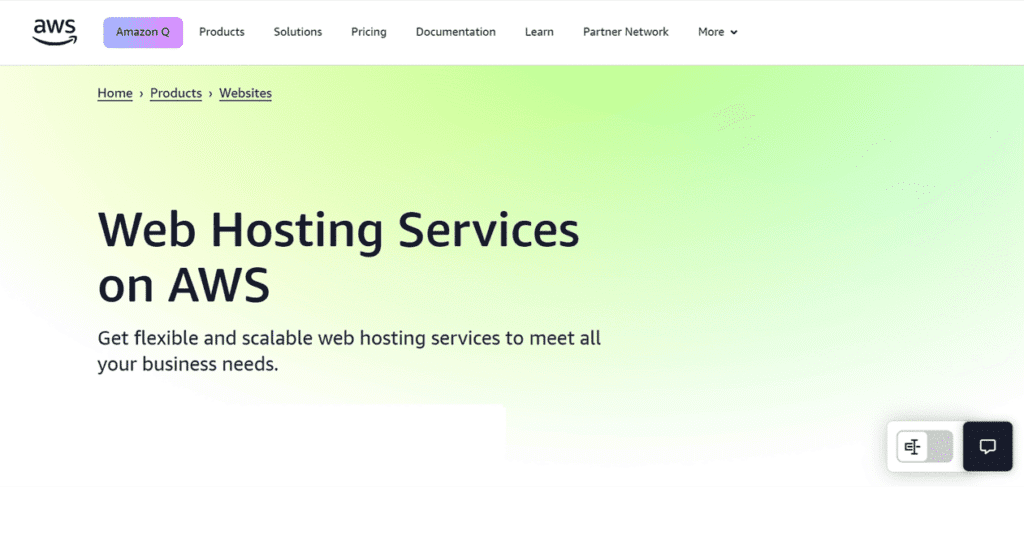
Thousands of enterprise apps, SaaS platforms and fast-scaling tech teams run on Amazon Web Services. The platform is a good fit for businesses that need granular control, regulatory compliance and integration with complex app ecosystems.
Key features:
- 200+ services and tools.
- Auto-scaling and load balancing.
- Enterprise-grade SLAs.
- Broad global coverage.
Pros:
- Exceptional scalability.
- The vast ecosystem of services with extensive developer tools.
- AWS dominates the enterprise market with unmatched scalability and reliability.
- Trusted by top global brands.
Cons:
- Complex setup and billing structure.
- Requires technical expertise.
4. Google Cloud Platform (GCP) — Best for AI-driven and data-centric apps

Product teams building data-rich apps or advanced user-facing features often turn to GCP for its AI/ML tools and real-time analytics. The platform also performs well across distributed workloads.
Key features:
- BigQuery and AI integrations.
- Global private fiber network.
- Secure-by-default infrastructure.
- DevOps-friendly solutions.
Pros:
- Built-in support for AI/ML.
- Transparent networking and billing.
- Excellent documentation and APIs.
Cons:
- It can be an overkill for simple websites.
- It is not as beginner friendly as the managed hosts.
5. Microsoft Azure — Best for Microsoft-first businesses and hybrid cloud setups

Businesses in regulated industries often choose Microsoft Azure for its deep integration with enterprise security and Microsoft tools. Those using Windows-based infrastructure or compliance-heavy apps benefit from its flexible deployment options.
Key features:
- Azure Active Directory & Windows Server support.
- Global data center reach.
- Built-in compliance and governance.
- Rich AI, IoT and app services.
Pros:
- Seamless for Microsoft users.
- Strong hybrid and on-premise support.
- Rich enterprise toolset.
Cons:
- Complicated dashboard layout.
- Costs can add up quickly.
6. Kamatera — Best for custom configurations and test environments
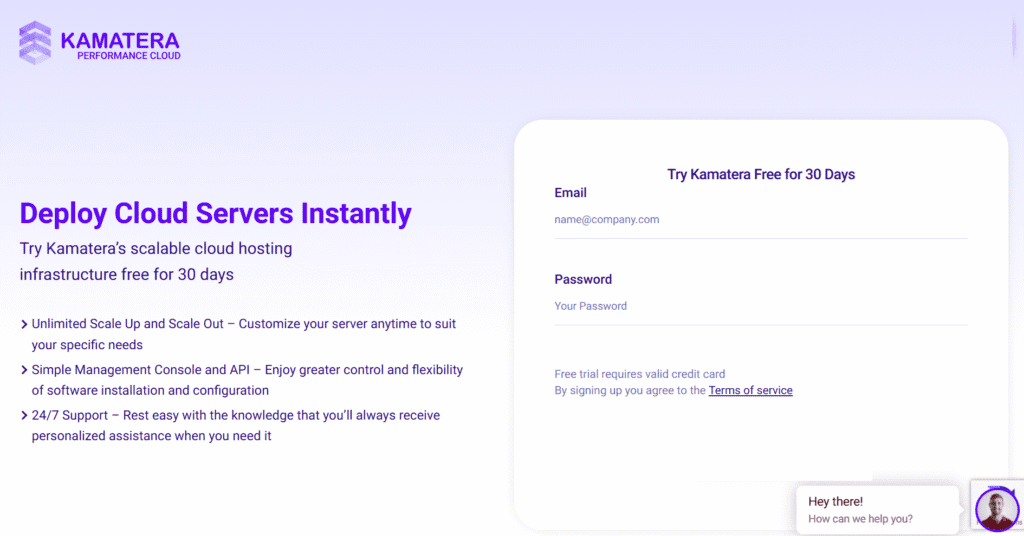
Many startups, sysadmins and QA teams turn to Kamatera for building flexible sandbox environments. It offers full control over server specs, OS and scaling, making it ideal for fine-tuning deployments.
Key features:
- Instant server provisioning.
- Worldwide data center access.
- Hourly billing options.
- Root-level access.
Pros:
- Highly customizable.
- Affordable for short-term needs.
- Excellent speed and strong uptime performance.
Cons:
- There is no built-in managed support layer.
- Not ideal for beginners and non-technical users.
7. SiteGround — Best for performance-focused WordPress sites
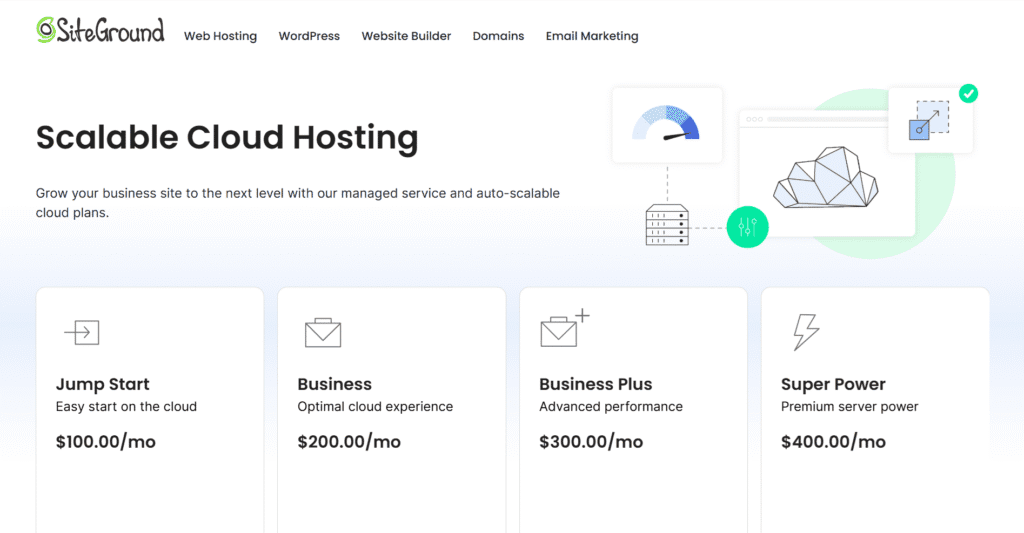
Small teams and solo WordPress site owners often choose SiteGround for its fast performance and user-friendly management. Built on Google Cloud infrastructure, it offers high-speed delivery and robust security.
Key features:
- Built-in SuperCacher accelerator.
- Free CDN and SSL.
- Daily backups and staging tools.
- Optimized for WordPress.
Pros:
- Fast and stable website performance.
- Supportive, beginner-friendly UI.
- Developer tools included.
Cons:
- Higher renewal prices.
- Limited storage on base plans.
8. IONOS — Best for budget-conscious startups
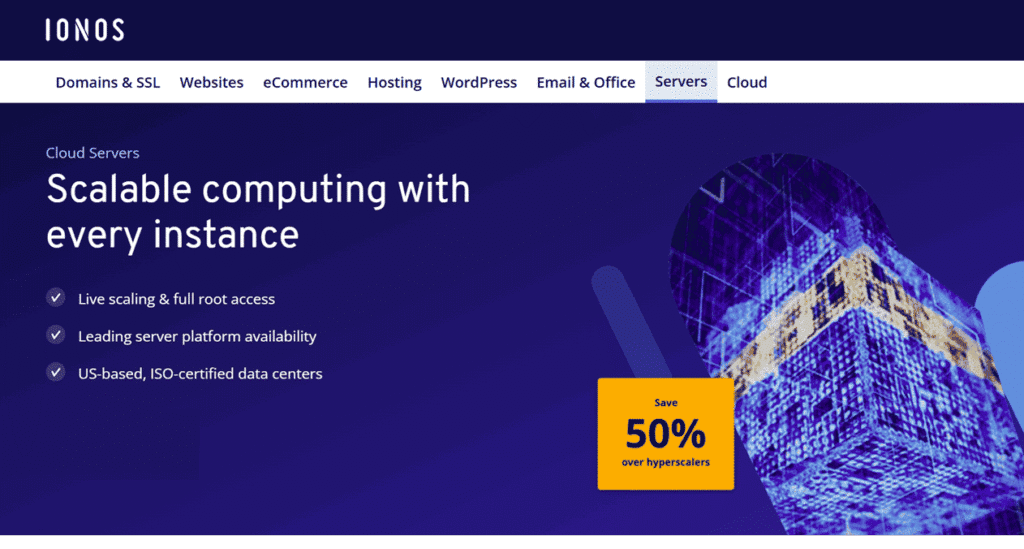
Entrepreneurs launching their first projects often pick IONOS for its simplicity, strong security and transparent pricing. The platform offers entry-level cloud hosting and is especially popular among users in Europe.
It also supports email setup, making it ideal for startups needing basic hosting and communications.
Key features:
- DDoS protection.
- Free domain and basic security features.
- Scalable server cloud hosting solutions.
- Localized data centers.
Pros:
- Affordable plans for small teams.
- GDPR-compliant infrastructure.
- Strong basic features.
Cons:
- Limited support responsiveness.
- Less user-friendly UI.
9. DreamHost — Best for developers who want flexibility

Developers who value open platforms and hands-on configuration often choose DreamHost for its transparency, control and strong WordPress support. The platform is built with developers in mind.
Key features:
- Custom-built control panel.
- Unlimited bandwidth.
- All plans include optional email support and domain tools.
- Built-in caching.
- SSD-powered storage on all plans.
Pros:
- High developer control.
- Transparent pricing.
- Solid WordPress performance.
Cons:
- No phone-based support.
- The interface may feel dated.
10. DigitalOcean — Best for startups building apps and APIs
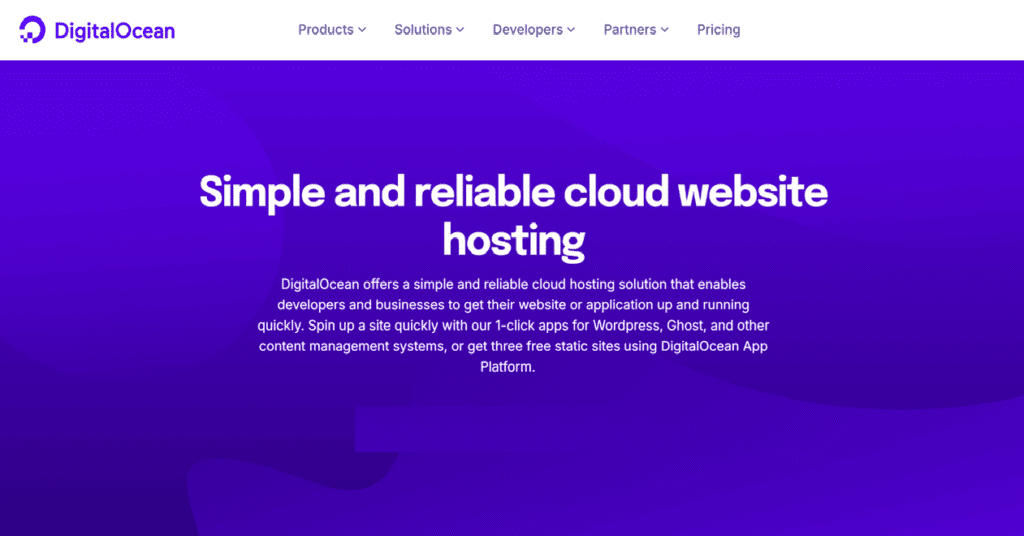
Developers building early-stage products or fast-moving teams testing MVPs often rely on DigitalOcean. It offers simple setup, fast deployment and a clean user experience tailored for speed and ease.
Key features:
- VPS Droplets and scalable block storage.
- App marketplace and 1-click installs.
- Team tools for collaboration.
- Monitoring and alerts.
Pros:
- Developer-first platform.
- Clean UI and helpful docs.
- Efficient for early-stage SaaS scaling.
Cons:
- Not ideal for non-technical users.
- Some features require third-party add-ons.
Ultimately, there’s no one-size-fits-all option when it comes to cloud hosting services. The best provider is the one that aligns with your goals, technical experience and plans for growth. Once you’ve defined those, picking a cloud hosting provider becomes much easier.
Final thoughts
Cloud hosting isn’t just a backend setup; it’s a foundation for your website’s long-term success.
From handling traffic spikes to ensuring daily reliability, the right provider plays a key role in your site’s performance and scalability.
That’s why we at Bluehost designed our cloud hosting plans to support your growth with an all-in-one business solution. Features such as global edge caching, daily backups, priority WordPress support, SEO support, built-in SEO tools and expert help are all included.
So, what else are you waiting for? Explore our Bluehost cloud hosting plans to see how we can keep your website fast, secure and always up, even during high traffic.
FAQs
Bluehost is one of the best cloud hosting options for startups. It combines ease of use, reliable performance and built-in tools that help new businesses launch quickly without needing a technical background.
Providers like Bluehost, Kamatera and SiteGround offer some of the fastest cloud hosting speeds. Each utilizes global data centers, SSD storage and caching technology to reduce load times across regions.
Yes, many cloud hosting plans include a free SSL certificate and domain name. For example, Bluehost includes both a free SSL certificate and a domain with every cloud hosting plan. This helps in improving security and search visibility from day one.
VPS hosting runs on a single physical server, while cloud hosting distributes resources across multiple servers. This makes cloud hosting more scalable and resilient to traffic surges or hardware failures.
Yes, cloud hosting is ideal for eCommerce websites. It provides the performance, uptime and flexibility needed to handle high traffic, product updates and secure transactions.



Write A Comment